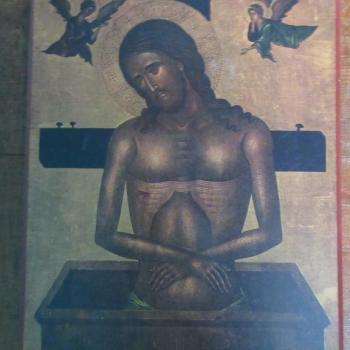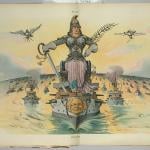 Having examined Maistre’s views of sovereignty and the similarity he saw between the establishment of laws within a nation and the development of Christian doctrine, it is finally time to turn to his notions on papal infallibility. Before we do so, we must reflect some more on his beliefs about sovereignty, because they relate as to why he believed papal authority was superior to any other.
Having examined Maistre’s views of sovereignty and the similarity he saw between the establishment of laws within a nation and the development of Christian doctrine, it is finally time to turn to his notions on papal infallibility. Before we do so, we must reflect some more on his beliefs about sovereignty, because they relate as to why he believed papal authority was superior to any other.
Maistre believed that providence determined the duration of any sovereignty; what was true of secular sovereignties was certainly true within the sacred realm. The Catholic Church has the providence of God guaranteeing its authority. Because it is a spiritual authority, it is even more tied to the dictates and will of God than mere secular powers. “The Christian religion is the only institution which does not admit decay, because it is the only divine one.” [62] The Church is destined never to fail in its mission; it is unlike any other worldly institution or power.
And yet the Church is in the world; she must govern people. Maistre, who had a dislike for democracies when it came to secular states, threw out the possibility of the Church as being seen as a democracy; instead, he said that its way of authority can only be monarchial. A democracy is suitable only for small groups of people; the size of the Church requires it to act as a monarchy. “The very idea of universality supposes that form of government [monarchy], with the absolute necessity lying with the double reason of the number of its subjects and the geographical extent of the empire.” [63] But who is to be the monarch? History has shown it is the pope, even if popes have exercised authority differently in various historical eras, those popes have always been the leaders of the Church. “Without a doubt, it was not in its origin what it would become a few centuries later, but it is precisely here that it shows that it is divine. For everything that legitimately exists throughout the centuries, existed first in a germ, and then successively develops.” [64] He considered the Orthodox patriarchate as the only other possible ecclesiastical system, but dismissed it as being incapable of protecting Christian unity. “Sovereignty would be divided, but it would always exist; it would be necessary to change the creed and say: I believe in divided and independent churches.” [65]
Having demonstrated, at least to his own satisfaction, that the papacy is a divinely established monarchy, his political ideas were then used to declare papal infallibility. As we have already seen, he equated infallibility with sovereignty. “The form of monarchy being established, infallibility is nothing more than the necessary consequence of the supremacy, or rather, it is absolutely the same thing under two different names.” [66] Just as those who are governed should not question the final decisions of their legitimate sovereign, so should no Christian question the final decisions of the pope. “The one who has the right to say the Pope is in error, for the same reason would also have the right to disobey him. This would destroy supremacy (or infallibility)… ” [67]
Because the papacy possesses a spiritual authority which secular sovereigns do not have, this should provide some insight as to the difference between papal and civil authorities. Just as the spirit is higher than the physical, so a spiritual authority should possess greater authority than their secular counterparts. This reasoning allowed Maistre to find a way to overcome the dangers of tyranny, because it meant that the pope would possess that authority needed to judge a secular sovereign. [68] If sovereignty comes from a spiritual source, then the pope, the spiritual authority par excellence, can judge other sovereignties and liberate people from tyrannies. He is the only one invested with a power which transcends that of an ordinary sovereign. However, that authority should only be used on rare occasions. “The Sovereign Pontiff, therefore, in removing subjects from their oath of fidelity, would not do anything contrary to divine law. He is solely confessing that sovereignty is a divine and sacred authority, which cannot be controlled by an equally divine authority, but by a superior order especially clothed by this power for certain extraordinary cases.” [69]
If papal infallibility is about the pope possessing absolute authority, what relationship did he see between the papacy and papal teaching? It is one thing to say no one has the authority to declare the pope to be in error, it is another to say that the pope has never erred. Thus, it must be asked, has a pope erred? Maistre’s answer to this question is interesting and clear. “Answering for all of the eighteen centuries, how often have the popes been incontestably wrong? Never. One can find some little squabbles, but it has never been possible to allege anything decisively.” [70] He examined those popes people have claimed to have had doctrinal error, but for each one, he showed why he thought such accusations were false. [71]
This consistency of the papacy, he believed, acts as a sure sign of divine intervention being the source of its authority. Providence can be shown to uniquely protect the papal see from error. However, this was not all he had to say about papal teaching, because he understood how simplistic this notion could appear, and that there were complications which needed to be addressed. As we have seen, Maistre believed that history showed that in this particular function of leadership, the popes have never erred. But he did point out that there is a difference between a pope acting as a teacher and as a private person. Thus, the exercise of papal authority, of papal infallibility, can only be done when the pope is acting in accordance with his office. Thus, similar to what Vatican I would say, he pointed out that the pope needs to be speaking “ex cathedra” for infallibility to be declared. “The defenders of this great privilege thus say, and say nothing more than this, that the sovereign Pontiff speaking freely to the Church, and, like the schoolmen say, ex cathedra, never has erred, and that he never will error on the faith.” [72] However, as an Ultramontantist, what he meant by this is greater than what would later be established.
While realizing the good intentions behind Maistre’s papal theory, that he thought the papacy could be used to establish peace in the world, we must nonetheless look at how he saw that peace would be enforced. For he came from a time where the world was at war, and the kind of order which he viewed as desirable was guaranteed by force. The reintegration of Christian teaching of the power of love to overcome opposition had yet to be examined, and the understanding that the greatest power lay in servitude was far from the minds of the general populace in his age. Therefore, we must turn to his understanding of power and how it is to be used to establish peace, even to coerce it, although one can question if he was doing this as a phenomenological description or as the ideal he wanted to uphold (how one answers this question will help determine one’s position on the culpability of Maistre for the development of fascism; and it will be left to the reader to determine their own view to this). Thus we must turn to those aspects of his thought which cause many to turn away from him and ignore the whole of Maistre’s project because of how repulsive those parts can be to modern readers.
 Maistre believed that a sovereign authority must have the right to administer justice in any way he or she deemed necessary to protect the peace. [73] Humanity is quick to fall into discord if not properly governed. In any state, but also in the Church, disobedience must be punished. For the state, there must be a variety of ways a sovereign can carry out such correction, including the death penalty. Punishment was, in Maistre’s eyes, an act of restitution. It doesn’t just help keep order, but it can help transform a criminal, and return them to a state of purity. This comes full circle with his rather odd, and quite easily abused, views on the death penalty. The death penalty must be used as a last resort, but when it is employed, it causes the criminal not only to be purified, but to become a holy victim offered up to God. When they are executed, not only are their sins expiated, but the sacrifice of their life works to expiate society from its collective sin. [74] His image of the executioner, similar to what Gene Wolfe would use for the torturer Severian, must be understood within this context. He is a grim, sorrowful, figure. Yet he is necessary to the preservation of order and society. “However all the grandeur, power and subordination rests on the executioner, he is the horror and link of human associations. Remove this incomprehensible agent from the world, and that same instant, order will change places with chaos, thrones come down, and society extinguished. ” [75] Because the executioner has a role in expiating sin, he is like a priest, working to eliminate sin from society and helping the criminal do some good for the society they have wronged. This idea developed out of Maistre’s notion of sacrifice: he believed that all religions saw the vitality of blood has a way of appeasing for sins, and so sacrifices, of any sort, even of criminals, was a way to appease providence. “The vitality of blood, or rather the identity of blood with life was posed as a fact that antiquity for no moment doubted, and has been repeated in our days. It was also an opinion as ancient as the world, that the heaven angered by flesh and blood, could only be satisfied (apaisè) by blood, and no nation doubted that in the effusion of blood there was an expiationary virtue.” [76] Surely one can see how easily such a view could be twisted and used to justify great evils, such as the Holocaust. And today, when we begin to hear similar claims for the force of arms, similar justification for the death of others, one can but wonder if it will not lead to another, future Holocaust, perhaps far more brutal than the first.
Maistre believed that a sovereign authority must have the right to administer justice in any way he or she deemed necessary to protect the peace. [73] Humanity is quick to fall into discord if not properly governed. In any state, but also in the Church, disobedience must be punished. For the state, there must be a variety of ways a sovereign can carry out such correction, including the death penalty. Punishment was, in Maistre’s eyes, an act of restitution. It doesn’t just help keep order, but it can help transform a criminal, and return them to a state of purity. This comes full circle with his rather odd, and quite easily abused, views on the death penalty. The death penalty must be used as a last resort, but when it is employed, it causes the criminal not only to be purified, but to become a holy victim offered up to God. When they are executed, not only are their sins expiated, but the sacrifice of their life works to expiate society from its collective sin. [74] His image of the executioner, similar to what Gene Wolfe would use for the torturer Severian, must be understood within this context. He is a grim, sorrowful, figure. Yet he is necessary to the preservation of order and society. “However all the grandeur, power and subordination rests on the executioner, he is the horror and link of human associations. Remove this incomprehensible agent from the world, and that same instant, order will change places with chaos, thrones come down, and society extinguished. ” [75] Because the executioner has a role in expiating sin, he is like a priest, working to eliminate sin from society and helping the criminal do some good for the society they have wronged. This idea developed out of Maistre’s notion of sacrifice: he believed that all religions saw the vitality of blood has a way of appeasing for sins, and so sacrifices, of any sort, even of criminals, was a way to appease providence. “The vitality of blood, or rather the identity of blood with life was posed as a fact that antiquity for no moment doubted, and has been repeated in our days. It was also an opinion as ancient as the world, that the heaven angered by flesh and blood, could only be satisfied (apaisè) by blood, and no nation doubted that in the effusion of blood there was an expiationary virtue.” [76] Surely one can see how easily such a view could be twisted and used to justify great evils, such as the Holocaust. And today, when we begin to hear similar claims for the force of arms, similar justification for the death of others, one can but wonder if it will not lead to another, future Holocaust, perhaps far more brutal than the first.
And yet, there is a kernel of truth behind what Maistre tried to express, because Christian theology does recognize that Christ took upon himself the ultimate sacrifice by becoming the criminal-sacrifice, and in this way he was able to join himself in solidarity with all who have committed crimes against God. But the differences between the two must not be forgotten: Christ was to show that it is through weakness and defeat that salvation is to be had, not through control and force; Maistre’s view was about the preservation of the old order through force, but Christ came in to bring in a new order through love.
Footnotes
[62] Joseph de Maistre, Du Pape, OC, 31.
[63] Ibid., 3.
[64] Ibid., 34. From pages 34 – 111, Maistre set out to demonstrate in an ingenious rhetorical flourish the historical fact of papal sovereignty, drawing on a wide diversity of sources, from the rudimentary and expected patristic citations, to those of his Gallican and Orthodox opponents.
[65] Ibid., 8.
[66] Ibid., 6.
[67] Ibid., 7.
[68] Jean-Louis Darcel, “Joseph de Maistre, New Mentor of the Prince: Unveiling the Mysteries of Political Science,” in Joseph de Maistre’sLife, Thought and Influence: Select Studies (ed. Richard A. Lebrun; Montreal: McGill-Queen’s University Press, 2001), 127 – 9. Here, we find an interesting observation by Darcel, who suggest behind Maistre’s utopian vision there is an apocalyptic, “illuminist” vision. “Du Pape concludes with a half-religious, half-developed hymn that occupies the last chapter XVIII. It is dedicated to the ‘holy Roman Church’ presented ‘as a superb spectacle,’ constructed like a Baroque glory of the churches in the Counter Reformation, or like one of those allegories cherished in the mystical lodges.” Ibid., 128.
[69] Joseph de Maistre,Du Pape, OC, 2:178.
[70] Ibid., 112.
[71] For example, the case of Honorius was brought up, where the pope was accused for being a monothelite on the evidence of a letter he wrote. At first glance, it might appear that the pope taught that Jesus had only one will. However, the problem is that the pope’s accusers never ascertained the context of the letter in question, which was about the human nature of Jesus. In his human nature, obviously, there is only one will, as Honorius, and even St Maximus the Confessor, witnessed. Indeed, for Honorius, instead of being a monothelite, as is often charged, “never ceased, until his last breath, to exhort, menace, reprimand these same monothelites… ” Ibid., 127-8.
[72] “Les défenseurs de ce grand privilege disent donc et ne dissent rien de plus, que le souverain Pontife parlant à l’Eglise librement, et, comme dit l’ecole, ex cathedra, ne s’est jamais trompé et ne se trompera jamias sur la foi.” Ibid., 112.
[73] However, it must be said that he thought it was the duty of the state, and not the church, to give civil punishments. The church has the right and authority to hear cases. She must pronounce judgment against error in order to protect her teachings and the unity of faith. But the consequences of such judgments depend upon the state: some saw Christian heresy as an offense against the state, and so rightfully punished such a heretic in order to preserve society. When they did so, the church is not responsible, especially if the state abused this right. See Joseph de Maistre, Lettres a un gentilhomme Russe sur L’Inquisition Espagnole, O.C., 3:303.
[74] “For Maistre, all criminal punishment bears the doubleaspect that he attributes to sacrifice: the restraining of evil (violence against the violent) and its expiation. He thus describes capital punishment as the limit case of punishment taken as a form of correction as it passes into pure expiation…” Bradley, New Maistre, 64.
[75] Joseph de Maistre, Les Soirées de Saint-Pétersbourg, O.C., 4:33.
[76] Joseph de Maistre, Éclaircissement sur les Sacrifices, O.C., 5:300.












